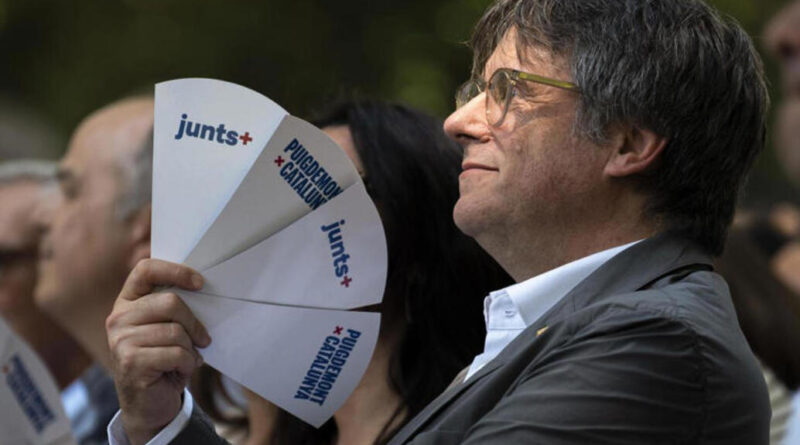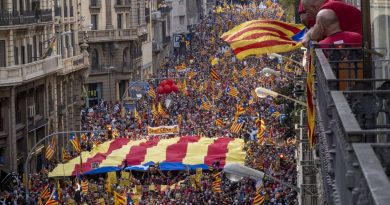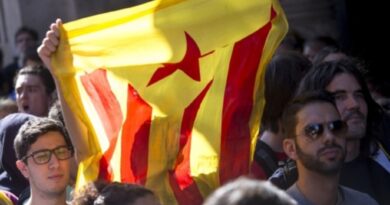together: a bourgeois party that the Catalan bourgeoisie no longer recognizes as its own
Author: Gérard Florenson
A few days before the Day of 11 of September, the confusion that has taken over Catalan circles after the victory of Salvador Illa (Party of Socialists of Catalonia – PSC) favors the return of an old discourse in favor of the unity of the pro-independence parties where they claim to be so, a unity presented as the only way to restart the “trial”. This position is clearly stated by the Catalan National Assembly (ANC) and its president Lluis Llach: all together without class distinction or division between right and left, all catalans. The crisis that shakes the Republican Left of Catalonia (ERC) and its agreement with the PSC to invest in Illa, an agreement felt like a betrayal by many independence supporters, makes Junts seem more radical and less committed to the Spanish State. Therefore, It is essential to remember some truths about its nature and its politics. The failure of the Procés must open a deep debate about what path to adopt to achieve self-determination.
a bourgeois party
Junts is a bourgeois party because of its history, for its program and for its social base. Your genealogy: the political formations that the great Catalan bourgeoisie, who was never republican or independentist, has been going on for more than a century, to defend their interests both within the Spanish State and in Catalonia. Its program is that of a center-right party, firm defender of liberal capitalism which he aims to civilize a little. This is reflected in all their positions and votes when it comes to private property and employer privileges.. Advocates for a broader statute of autonomy for Catalonia but to better respond to the demands of capitalists. Its social base is similar to that of the Popular Party (PP): industry bosses and senior executives, commerce and finance, owners and some Catholic circles, andthis is its core;your electorate is, Of course, wider.
From love to divorce
What is obvious: The Catalan bourgeoisie no longer trusts the Junts leaders to defend their interests. He would be indifferent to the fate of Carles Puigdemont and the other exiles if their imprisonment threatened to relaunch popular mobilizations.. He hopes that the amnesty will guarantee social peace by erasing the memory of the 1-O Referendum. Like every time order seemed threatened, during the application of the article 155, The large capitalist groups complied without blinking with the instructions of Mariano Rajoy and the king to move their headquarters. The Referendum, the proclamation of the Catalan Republic, even immediately buried, the conflict with the Spanish State, This adventurism was unbearable for them.: Junts repudiated the bourgeoisie and turned for a time towards Ciutadans and Manuel Valls, but it was a fiasco. Today, still wanting business-friendly political stability, is satisfied with the PSC-ERC agreement. Clear, Salvador Illa is not too Bolshevik...
A bourgeoisie neither republican nor independentist
At a time when in most European countries the bourgeoisie, that is, the class of capitalists, owners of industry and finance, seized power from the hands of the aristocracy and established governments at their service, Spain was far from having reached this stage of development. The events that especially marked neighboring France were beyond their understanding. In 1830, the french bourgeoisie, ally of the working classes, He returned to enjoy absolute monarchy after three days of insurrection. The dynastic change that followed installed a king favorable to their interests in power.. Then, in 1848, when revolutions shook almost all European countries, He pretended to play along and even accepted a Republic to protect himself from the dangers, taking advantage of the first opportunity to turn against the proletariat, the army carried out a bloody repression. The bourgeoisie then found a protector in the person of Napoleon III and a long period of prosperity followed.. With its consolidated power, was able to proclaim the Republic and crush the Commune.
During the same period, the Catalan bourgeoisie was, together with the Basque, the only one who had reached a certain level of development. Spain was dominated by the Castilian and Andalusian aristocracy, a caste of large landowners supported by an all-powerful Catholic church. For reasons linked to the history of absolutism, Catalans found themselves excluded from all power structures, both political and economic: Thus, decisions on protectionism or free trade were made without consulting them. The Catalan bourgeoisie did business and even benefited from trade with the Spanish colonies when it suited them., It also wanted to be more European than the rest of the peninsula, progressive in its own way, He entrusted the style of his houses and sometimes his factories to modernist architects. To understand what his aspirations were then, we must read his proclamations from the beginning of the 20th century, such as the Greuges memorial and the Manresa Bases.. He defends himself against any accusation of separatism and demands more autonomy for the good of Catalonia… and from Spain. Not only does he not question the monarchy, But their demands take the form of petitions addressed to the king rather than revolutionary speeches..
It would be necessary to return to all the positions of the Catalan bourgeoisie since the end of the 19th century and therefore to the history of La Liga1 what was his political representation. Fear of the labor movement still weighs more than Catalanism. The League and its bourgeois patrons take refuge at the slightest alarm in the arms of the Castilian dynastic parties.. Among other infamies, the refusal of the La Liga press to publish the letter from the poet Joan Maragall asking for the forgiveness of Ferrer and his companions sentenced to death. Against the CNT, The Catalan bourgeoisie recruited gunmen under the protection of the pseudo free union to assassinate leaders and activists.
It should also be noted that in 1934, to defend the big landowners, The League did not doubt that the Spanish “justice” would repeal a law of the Generalitat on rural leases favorable to small and medium farmers. At the beginning of the Second Republic, The League had lost a lot of influence to the benefit of ERC, the Catalan left. At the same time, labor unionism was powerful, mainly the CNT in Catalonia. In the legislative elections of 1936, The League allied itself with the Spanish right within the “Front of Order”, a whole program...
The Catalan bourgeoisie under Franco
After the failure of the military coup throughout Catalonia, most capitalists went into exile, some abroad but most in Franco's area. They returned after the victory of the fascists, putting Catalanism in his pocket because the very word made Franco bristle, but the main thing was that they recovered their businesses, its properties, its modernist houses, their lands and who got rid of the Reds and unionists. On the political level, The Francoists did not hesitate to use the right-wing Catalans, many of whom came from La Liga. While education and administration were purged and fascists from different regions replaced the deposed Catalans, The bourgeoisie held more positions than before the Republic.
Instead, For businessmen, the blessed times did not return immediately; They were the same throughout Spain. The economic leadership, autarky and international isolation, which continued more than ten years after the end of World War II, they were not conducive to business, but they consoled themselves by saying that with the reds it would have been worse. Let's calm down: if the working classes lived in terrible poverty, the rich would not die of hunger. The situation changed in 1957 when the “democracies” began to recognize the regime, which had become a bulwark against communism: Administrative restrictions were relaxed and Spain opened to foreign capital. It is the hour of development that the Catalan bourgeoisie was patiently waiting for and that was becoming a priority of the regime.. Industrial production was taking off and its competitiveness depended on low wages: the strikes (and there were) were harshly repressed. But it was the construction sector that generated the greatest profits.
To illustrate all of the above we quote an emblematic name, that of Josep Maria de Porcioles: notary, former convert of La Liga to Francoism, member of Opus Dei like his protector and friend López Ròdò who was in charge of the development, Porcioles was appointed (there were no elections) Mayor of Barcelona in 1957 and it remained that way for 16 years. Some say that Porcioles modernized the city and that his results were positive, others that has been disfigured. The truth is that the great Catalan families, as well as many new rich, They have made a fortune thanks to the Mayor: big projects, real estate speculation, bank loans… at the expense of tens of thousands of workers in southern Spain, overexploited and housed in deplorable conditions.
In 1983 the “socialist” Mayor of Barcelona, Pasqual Maragall, awarded Josep Porcioles the city's gold medal; great example of a successful transition.
The Catalan bourgeoisie after the death of Franco
The disappearance of the dictator quickly opened the so-called period of democratic transition, under the leadership of His Majesty Juan Carlos, the successor designated by Franco. The bourgeoisie remember a little of their Catalan culture to the point of attending masses said in this language and dancing the sardana., and above all they discover that Franco's regime was a bit dictatorial; so, It is better to be discreet about the years of fruitful collaboration. The Catalan bourgeoisie needed presentable political representation to establish its power and prepare for future elections.: make something new with something old, claim to be “centrist” as Adolfo Suárez did at the national level. Jordi Pujol was his providential man: son of a good family, In his youth he had been sentenced to 7 years in prison (fulfilled 3) as instigator of a Catalan demonstration, therefore victim of the dictatorship. After some regroupings, in 1978 the center-right party was formed, moderately autonomous, what they needed, Convergence and Union (CiU). A party flexible enough to have joined forces, according to the needs of their bosses, with Adolfo Suárez, then with Felipe González and then with José María Aznar.
Artur Mas swims with the current
CiU governed Catalonia until he was displaced in 2003 for an alliance of ERC with the socialists and communists, and then regained power in 2010. Arthur Mas, Pujol's successor, He was elected president of the Generalitat thanks to the abstention of the Popular Party. The Catalan bourgeoisie had nothing to complain about. He appreciated less what he considered an independence turn. At the head of a party that became the Democratic Party of Catalonia and then the European Democratic Party of Catalonia (PdeCAT) without the foundations of CiU having changed, But he faced a new situation; on the one hand, Social protest made it difficult to continue collaboration with the Spanish right. On the other hand, since the Spanish provocation of 2006, with the Statute of Autonomy largely approved by referendum in Catalonia and prohibited by Spanish “justice”, independence positions were gaining ground, what strengthened the Catalan left. The rest is pretty well known.: the agreement with ERC and the Popular Unity Candidature (CUP), the referendum held and won by batons, the article 155 and the repression...
¿Puigdemont, our president?
We can laugh at the way in which the police officers responsible for the arrest of Carles Puigdemont were deceived, and also remember that the elected president of the Generalitat was removed by force, questioning democracy. But that is not what is at stake for those who still greet Puigdemont as the president of all Catalans., therefore of the bourgeoisie and the proletarians united fraternally in the national demand. It is an orientation by which we would first have to achieve independence and then worry about the class struggle, a path without a socialist strategy that has already proven a failure to achieve self-determination. As we recalled in the preamble, Junts is a center-right bourgeois party, worthy heir of CiU. The fact that the bourgeoisie rejects it does not change anything, Junts continues to serve the rich: even worse, for fear of being surpassed by the Catalan extreme right, Junts accuses foreigners of being multi-criminals to demand the control of the Generalitat over immigration policy; unfortunate and similar to VOX. Of course we find ourselves alongside those who They defend the Catalan language, to exiles and activists persecuted by the Spanish State and in defense of democratic freedoms, but no political agreement is possible with Junts and even less a government agreement with the Generalitat. It is necessary to follow the path of class independence to achieve self-determination and a Catalan and Socialist Republic
(1) Regionalist League, renamed as The Catalan League. After the death of its founder and theorist, Enric Prat de la Riba, Its main leader was Francesc Cambò.




